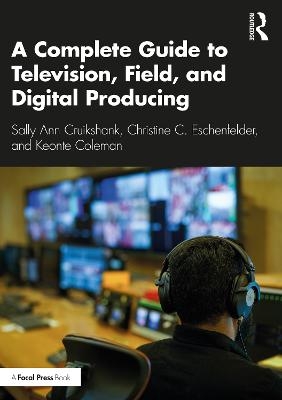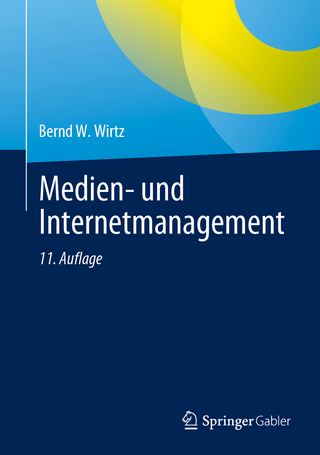
A Complete Guide to Television, Field, and Digital Producing
Routledge (Verlag)
978-0-367-48038-7 (ISBN)
Featuring interviews with renowned journalism professionals, A Complete Guide to Television, Field, and Digital Producing offers an in-depth look at the broadcast, field, and digital producing practices of newsrooms today. The book is divided into three parts: television news producing, field producing, and digital producing. Each part provides a clear explanation of the producing role before going into more detail on important skills such as developing stories, writing copy, creating graphics, producing live on location, audience engagement, and using social media. Each chapter includes a variety of supplemental material, including discussion questions, keyword definitions, classroom activities, and graded assignments, including rubrics. Written with a combined 64 years of journalism and journalism education experience, the book will prepare students to produce whatever their job requires.
Taking an integrated approach to journalism education, this is a vital text for journalism and media students studying digital media, broadcast journalism, social media, and reporting.
Sally Ann Cruikshank is an associate professor in the School of Journalism and Strategic Media at Middle Tennessee State University. She received her PhD from the E.W. Scripps School of Journalism at Ohio University, following an award-winning career as a television news producer. Her expertise is in digital media. She teaches a variety of journalism courses, and has conducted workshops on journalism around the world for students and working journalists. Cruikshank has traveled to several countries, including Rwanda and Ethiopia, to research press freedom. She has also conducted extensive research on mobile technology and social media. She lives in Nashville with her extremely patient and supportive husband Spencer and their two spoiled cats. When she isn’t teaching, researching, and writing, she enjoys traveling and knitting, often at the same time. Christine C. Eschenfelder is an associate professor in the School of Journalism and Strategic Media at Middle Tennessee State University. She earned her PhD in Mass Communication from the University of Florida. Before joining the faculty at MTSU, Eschenfelder worked in television news as a reporter, anchor, and producer. She is the recipient of several broadcast industry awards including the Edward R. Murrow Award. The courses Eschenfelder teaches include Media Ethics, Television News Producing, and Video Reporting. She also leads Study Abroad journalism classes to various international locations. She is a recipient of the MTSU Outstanding Teaching Award. Her research focuses on broadcast journalism education, newsroom diversity, and women in broadcasting. She is the proud mother of two amazing children and is married to a creative and energetic videographer. Keonte Coleman is an assistant professor in the School of Journalism and Strategic Media at Middle Tennessee State University. Coleman loves sharing his passion for media and helping students find their voices as storytellers. He previously served as an academic administrator and assistant professor at Bennett College, and was an award-winning television news producer before transitioning to the classroom. The Tupelo, Mississippi, native earned his PhD in Higher Education Administration from the University of North Carolina at Greensboro, his MS in Broadcast Journalism from the Newhouse School of Communications at Syracuse University, and a BS in Mass Communications from Jackson State University. Coleman’s research focuses on diversity, journalism, leadership, media, and higher education. He’s married to the love of his life and is the proud father of three beautiful children.
Part I: Television News Producing
Chapter 1: Day in the Life of a News ProducerChapter Break: Meet a Journalist – Profile of a News Producer
Chapter 2: Stacking is a Dirty Word: News Judgment and the Rundown
Chapter 3: Produce Moments and Develop Stories
Chapter 4: Writing Headlines and Teases
Chapter 5: Using Graphics: The Good, the Bad, and the Ugly
Chapter 6: The Producer as a Leader, Manager, and Coach
Chapter 7: Breaking News and Live Shots
Chapter 8: Commanding the Control Room
Chapter Break: A Conversation with an Anchor about News Producers
Section Break: Self Care for Journalists
Part II: Field Producing
Chapter 9: The Ins and Outs of Field Producing
Chapter Break: Meet a Journalist – Profile of a Special Projects Producer
Chapter 10: Before You Leave the Newsroom
Chapter 11: Remote Location Live Shows
Chapter 12: Social Media from the Scene
Chapter 13: Diversity, Equity, and Inclusion Matters: Creating a Complete Story for Your Audience
Chapter 14: Taking Ownership of Stories and Shows
Chapter 15: Inside and Outside the Newsroom: Law and Ethics
Section Break: Getting a Job as a Producer
Part III: Digital Producing
Chapter 16: What Does a Digital Producer Do?
Chapter Break: Meet a Journalist – Profile of a Digital Producer
Chapter 17: Get Googled: SEO Best Practices
Chapter 18: Creating Eye-catching Infographics and Data Visualization
Chapter 19: Producing Video Inside the Newsroom
Chapter 20: Digital Producers and Social Media
Chapter 21: Measuring Your Audience through Metrics
Chapter 22: Behind the Paywall
| Erscheinungsdatum | 01.10.2021 |
|---|---|
| Zusatzinfo | 8 Tables, black and white; 1 Line drawings, black and white; 61 Halftones, black and white; 62 Illustrations, black and white |
| Verlagsort | London |
| Sprache | englisch |
| Maße | 174 x 246 mm |
| Gewicht | 1280 g |
| Themenwelt | Geisteswissenschaften ► Geschichte |
| Sozialwissenschaften ► Kommunikation / Medien ► Journalistik | |
| Sozialwissenschaften ► Kommunikation / Medien ► Medienwissenschaft | |
| Wirtschaft | |
| ISBN-10 | 0-367-48038-7 / 0367480387 |
| ISBN-13 | 978-0-367-48038-7 / 9780367480387 |
| Zustand | Neuware |
| Haben Sie eine Frage zum Produkt? |
aus dem Bereich


